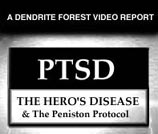Brief presentations of information on
aspects of PTSD:
- PTSD and Community Violence
- PTSD in Children
- PTSD and Problems with
Alcohol Use
- PTSD and Relationships
- PTSD and the Family
- Physical Health and
PTSD
- Survivors of Natural
Disasters
- Epdimological Facts About
PTSD --How
many people exposed to traumatic events have PTSD?
- Disaster and Rescue
Workers and PTSD
- Warning
Signs
Warning signs of trauma-related stress, from Los Angeles County Department of Mental Health.
- Warning
Signs from APA
Warning signs of trauma-related stress, from the American Psychological Assn.
- Victim Emotional Health
Emotional health issues for victims, from the American Red Cross.
- Coping
Suggestions
Coping suggestions, from Los Angeles County Department of Mental Health.
- Normalizing
Emotions
You are not alone! description of normal emotions following a disaster, from the American Red Cross.
-
Post-Traumatic Stress Disorder: An Overview" Matthew J. Friedman
The
Peniston Protocol
PTSD Treatment
VA
NATIONAL CENTER FOR PTSD
Research and Education on
Post-Traumatic Stress Disorder
PTSD in Children
A National
Center Fact Sheet
Children often
are exposed to trauma as a result of the following kinds of events:
- physical or sexual assault or abuse
- family and community violence
- experiencing or witnessing severe accidents
- natural or technological disasters
- life-threatening illnesses
- war
Many studies have shown that there is a connection between children's exposure to traumatic events and psychological problems. These include not only full-scale PTSD, but also problems with:
- peer relationships
- relationships within the family
- self-esteem
- school activities and performance
- sexual behavior (in cases of sexual abuse)
- emotional development
- depression and anger
- physical health
- substance abuse
- fears
- anger
- guilt
- feeling ashamed
PTSD symptoms in children may last for a long time, and may include:
- disturbing memories or flashbacks
- repeated nightmares and dreams of death
- belief in omens and prediction of disastrous future events
- pessimism about the future and expectation of early death
- avoiding reminders of traumatic experiences
- fear of re-experiencing traumatic anxiety
- behavioral re-enactment (expressed as repetitive play)
- emotional numbness (seeming to have no feelings, except perhaps anger)
- diminished interest in significant activities
- physical symptoms, such as stomachaches and headaches
- feeling constantly on guard, or nervous and jumpy
In addition, surviving or witnessing traumatic events may intensify symptoms of other psychiatric disorders, such as:
- attention-deficit hyperactivity disorder
- dissociative disorders
- eating disorders
- major depression
- oppositional defiant disorder
- panic disorder
- phobias
- separation anxiety disorder
Treatment of PTSD in children generally involves "talking therapies" (such as cognitive behavioral therapy, family therapy, or brief psychotherapy), and may include the prescription of medication by a psychiatrist. The goals are:
- helping the child to remember the traumatic events safely
- addressing the child's family life, peer relationships, and school performance
- dealing with grief, guilt, anger, depression, anxiety, and behavioral disturbances
It is best to seek treatment from a professional with expertise in this area. Many therapists with this expertise are members of the International Society for Traumatic Stress Studies, whose membership directory contains a geographical listing indicating those who treat children and adolescents.

